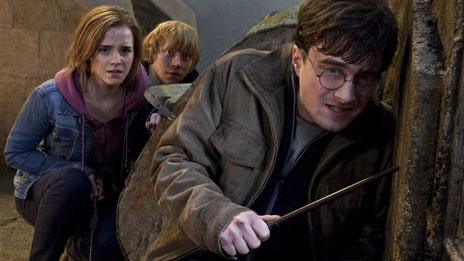UK film industry worth £4.6bn in 2011, report suggests
- Published

Harry Potter and the Deathly Hallows Part 2 was the biggest film of 2011 at the UK box office
The UK film industry contributed more than £4.6bn towards the UK GDP (Gross Domestic Product) in 2011, according to an independent report, external.
It said the industry has "grown significantly" in the last 20 years.
The number of UK films has grown from an average of 43 in the 1980s to 136 in the 2000s, according to report author Oxford Economics, a global forecaster.
The economy was worth about £1.5 trillion in 2011, with UK film accounting for 0.3% of GDP last year.
The GDP is a measure of the value of goods and services produced in the economy.
The report said UK box office receipts hit a record high last year of £410m, boosted by films including Harry Potter and the Deathly Hallows: Part 2 and Sherlock Holmes: A Game of Shadows, plus independent films such as The King's Speech and The Inbetweeners Movie.
'Long-term growth'
The most recent previous report on the film industry, external, also by Oxford Economics found that, in 2009, the core UK film industry contributed £4.5bn to UK GDP.
The 2012 report suggested the 2011 figures demonstrated that "despite the on-going recession the UK film industry is thriving".
It also stated the number of jobs the industry sustains has risen from 100,000 in 2009 to 117,400, while tourism generated by films depicting the UK was estimated to have contributed about £1bn to UK GDP.
"With a significant upward trajectory over the last 20 years, the overall picture for the UK film industry is of continued long-term growth," said the report, adding: "Growth outstrips the UK economy as a whole; there is significant and continued investment in infrastructure."
By comparison, another major contributor to the UK's creative industries is the music industry, which last year made £3.8bn, according to PRS For Music, which represents songwriters, composers and publishers.
Creative Industries minister Ed Vaizey said the film industry report "clearly highlights the huge contribution that the UK film industry makes to long-term economic growth".
"The UK's successes at the Bafta and Academy Awards celebrate the wonderful creative talents and accomplishments of UK film, but this report reminds us of the crucial role the industry plays in job creation, tourism, inward investment and the promotion of all that is great about Britain," he added.
The report, which is updated every two years, explored the following aspect of the British film industry:
Jobs and skills
Exports
Tourism
Inward investment
Promoting British culture
Merchandising
New technologies
It also estimated that production would be 71% smaller without Film Tax Relief, which is suggested to cost HM Treasury about £114m per year, generating about £12 for every £1 invested.
Films that qualify for the relief are British films intended for commercial release in UK cinemas and of whose total production costs, at least 25% relate to activities in the UK.
"Without it [tax relief], national GDP would be reduced by approximately £1.4bn a year and Exchequer revenues by £430 million a year," the report stated.
Adrian Wootton, chief executive of Film London and the British Film Commission said: "The UK film industry has proved itself to be vital to the economy and that is something which should be celebrated, and of which we should be very proud."
The report was commissioned by the British Film Institute and Pinewood Shepperton plc, with support from the British Film Commission and Creative England.
- Published6 July 2012

- Published31 January 2012

